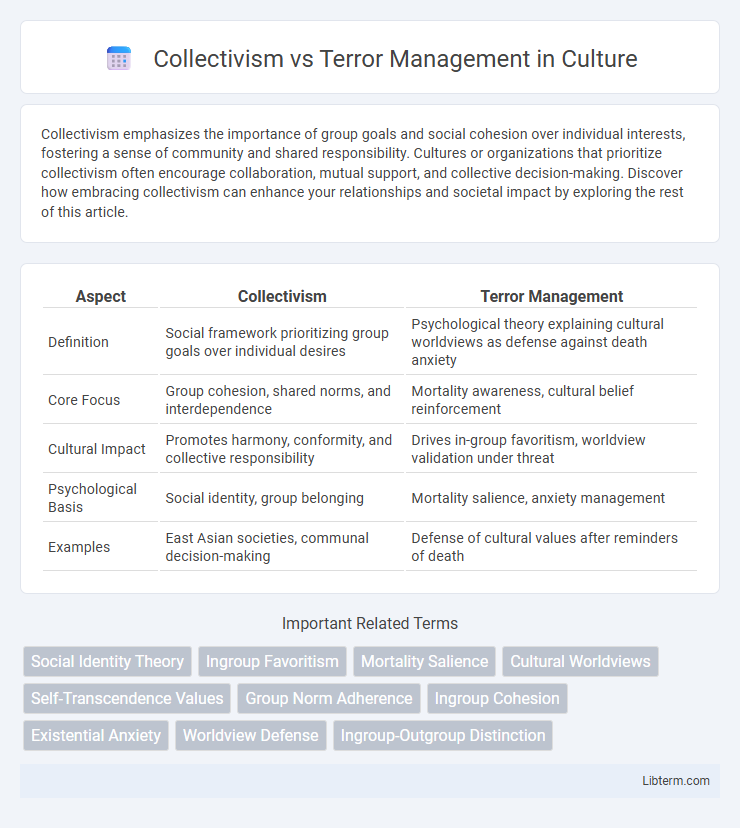Collectivism emphasizes the importance of group goals and social cohesion over individual interests, fostering a sense of community and shared responsibility. Cultures or organizations that prioritize collectivism often encourage collaboration, mutual support, and collective decision-making. Discover how embracing collectivism can enhance your relationships and societal impact by exploring the rest of this article.
Table of Comparison
| Aspect | Collectivism | Terror Management |
|---|---|---|
| Definition | Social framework prioritizing group goals over individual desires | Psychological theory explaining cultural worldviews as defense against death anxiety |
| Core Focus | Group cohesion, shared norms, and interdependence | Mortality awareness, cultural belief reinforcement |
| Cultural Impact | Promotes harmony, conformity, and collective responsibility | Drives in-group favoritism, worldview validation under threat |
| Psychological Basis | Social identity, group belonging | Mortality salience, anxiety management |
| Examples | East Asian societies, communal decision-making | Defense of cultural values after reminders of death |
Understanding Collectivism: Core Principles
Collectivism emphasizes prioritizing group goals, social cohesion, and interdependence over individual desires, fostering a strong sense of belonging and mutual support. This cultural orientation promotes shared responsibility, cooperation, and conformity to social norms, which can enhance group stability and psychological security. Collectivist values often intersect with terror management theory, as adherence to group beliefs serves as a defense mechanism against existential anxiety.
Terror Management Theory: An Overview
Terror Management Theory (TMT) explores how humans cope with the existential fear of death by adhering to cultural worldviews and pursuing self-esteem, which provide a sense of meaning and permanence. This psychological framework posits that reminders of mortality trigger defense mechanisms such as increased in-group favoritism and adherence to collective beliefs to mitigate death anxiety. TMT research reveals that these mechanisms promote social cohesion but can also heighten intergroup conflict, contrasting with collectivism's emphasis on group harmony and shared values.
Cultural Foundations of Collectivism
The cultural foundations of collectivism emphasize group cohesion, social harmony, and interdependence as fundamental values shaping individual behavior and identity. Collectivist societies prioritize maintaining strong in-group bonds and shared norms, which serve as symbolic systems providing existential meaning and psychological security in the face of mortality threats. This alignment with terror management theory suggests collectivism functions as a cultural buffer, reducing death anxiety by reinforcing collective self-esteem and shared cultural worldviews.
Fear of Mortality and Social Behaviors
Fear of mortality significantly influences social behaviors through collectivism, as individuals turn to group affiliations to achieve a sense of symbolic immortality and social significance. Terror Management Theory (TMT) explains that awareness of death anxiety strengthens in-group cohesion, leading to increased conformity, altruism, and adherence to cultural norms as mechanisms to mitigate existential dread. Collectivism promotes shared beliefs and values, which buffer mortality salience by fostering social support and reinforcing collective identity, thereby enhancing psychological resilience against fear of death.
How Collectivist Societies Manage Existential Anxiety
Collectivist societies manage existential anxiety by emphasizing social cohesion, shared values, and community support, which create a collective identity that buffers individual fears of mortality. Rituals, traditions, and group memberships reinforce meaningful connections and provide a sense of purpose, reducing feelings of isolation and death-related anxiety. Studies in cultural psychology demonstrate that collectivism fosters resilience against existential threats through social validation and interdependence.
Comparative Analysis: Individualism vs Collectivism in Crisis
Collectivism emphasizes group cohesion and shared responsibility during crises, often enhancing social support and collective resilience, whereas individualism prioritizes personal autonomy and self-reliance, potentially limiting cooperative behaviors essential for effective crisis management. Terror management theory suggests that collectivist cultures buffer existential fear by reinforcing group identity and shared values, while individualist cultures manage terror through self-esteem and personal achievements. Comparative analysis reveals collectivism fosters communal coping and unified actions, whereas individualism may lead to fragmented responses but encourages innovative problem-solving under stress.
The Role of Community in Reducing Terror Management Stress
Community engagement plays a critical role in alleviating terror management stress by fostering a sense of belonging and purpose that counters existential anxiety. Collectivism emphasizes shared values and group identity, enhancing psychological security when confronting threats related to mortality awareness. Social support networks within collectivist cultures provide resilience mechanisms, reducing defensive responses typically triggered by terror management processes.
Collectivist Responses to Threat and Uncertainty
Collectivist responses to threat and uncertainty emphasize social cohesion, group loyalty, and shared identity to mitigate anxiety and reinforce stability. These responses often involve increased in-group favoritism, conformity to group norms, and reliance on collective rituals that enhance a sense of meaning and security. This framework contrasts with individualistic coping strategies by prioritizing communal support and interdependence during existential threats.
Psychological Mechanisms Linking Collectivism and Terror Management
Collectivism influences terror management by promoting group cohesion and shared cultural worldviews that provide individuals with meaning and security in the face of mortality salience. Psychological mechanisms such as increased in-group identification and adherence to collective norms help mitigate existential anxiety by reinforcing a sense of belonging and symbolic immortality. These processes enhance psychological resilience by aligning personal identity with stable, socially endorsed values that buffer death-related fears.
Implications for Social Policy and Global Cooperation
Collectivism, emphasizing group cohesion and shared responsibility, can enhance social policies by promoting unity and mutual support, crucial for managing existential threats as highlighted by Terror Management Theory. Terror Management underscores the role of mortality awareness in shaping human behavior, suggesting social policies that incorporate cultural worldviews and collective identities may reduce anxiety and foster resilience. Effective global cooperation requires integrating collectivist values with Terror Management insights to design frameworks that address fear-driven conflicts and enhance collaborative efforts across diverse populations.
Collectivism Infographic

 libterm.com
libterm.com